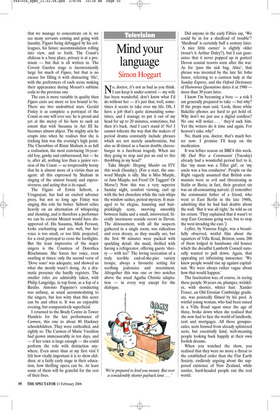Mind your language
Simon Hoggart
No, doctor, it’s not as bad as you think. I can keep it under control — my wife has been wonderful, don’t know what I’d do without her — it’s just that, well, sometimes it seems to take over my life. Oh, I have a job that’s quite demanding sometimes, and I manage to put it out of my head for up to 20 minutes, sometimes, but then it’s back. And I can’t stand it! No! I cannot tolerate the way that the makers of period drama constantly include phrases which are not merely anachronistic, but also as ill-timed as a bacon double cheeseburger in a Jacobean tragedy. When are they going to stop and put an end to this throbbing in my head?
Take Marple: Sleeping Murder on ITV this week (Sunday). (For a start, the oneword Marple is silly. She is Miss Marple, or Jane Marple, not Frost! Or Taggart! Or Morse!) Now this was a very superior Sunday night, comfort viewing, curl up with the hot chocolate while the rain whips the window sashes, period mystery. It managed to be elegiac, haunting and hairpricklingly scary, swerving smoothly between India and a small, introverted, literally incestuous seaside resort in Devon. The dénouement, with all the suspects gathered in a single room, was ridiculous and even dreary, as they usually are, but the first 90 minutes were packed with sparkling detail: the maid, thrilled with having a refrigerator, offering guests ‘sherry — with ice!’ The loving recreation of a truly terrible end-of-the-pier variety troupe, always a favourite setting for seething jealousies and resentment. Altogether this was one or two notches above the usual Agatha Christie adaptation — in every way except for the dialogue. Did anyone in the early Fifties say, ‘We could be in for a shedload of trouble’? ‘Shedload’ is certainly half a century later. ‘A nice little earner’ is slightly older (wasn’t it Arthur Daley?), but I can guarantee that it never popped up in genteel Devon coastal resorts soon after the war. As for ‘pass the sick bag, Alice’, that phrase was invented by the late Sir John Junor, referring to a canteen lady at the Sunday Express, and the Oxford Dictionary of Humorous Quotations dates it at 1980 more than 30 years later.
I know I’m becoming a bore — a risk I am generally prepared to take — but why? If the props man said, ‘Look, those white Bakelite phones are hard to get hold of. Why don’t we just use a digital cordless? No one will notice ... ’ they’d sack him. Yet the writers do it time and again. For heaven’s sake, why?
No, thank you, doctor, that’s much better now. I promise I’ll keep on the medication.
It was lefties season on BBC4 this week. My Dad Was a Communist (Tuesday) already had a wonderful period feel to it, like ‘my mum was a Tiller girl’, or ‘my uncle was a bus conductor’. People on the Right vaguely assumed that British communists were as evil and threatening as Stalin or Beria; in fact, their greatest sin was an all-consuming naiveté. (I remember the communist father of a friend, who went to East Berlin in the late 1960s, admitting that he had had doubts about the wall. ‘But it was all right,’ he told us on his return. ‘They explained that it wasn’t to stop East Germans going west, but to stop the west invading the east.’) Lefties, by Vanessa Engle, was a beautifully observed, wistful film about the squatters of Villa Road, Brixton, some 200 of them lodged in handsome old houses which the dreadful Lambeth Council naturally wanted to pull down. Again, that appealing yet infuriating innocence: ‘We knew people would rise up against capitalism. We were always rather vague about how that would happen.’ The fascination was, of course, in seeing these people 30 years on, plumper, wrinklier, with shorter, whiter hair. Xander Fraser, an Old Etonian Cambridge graduate, was pointedly filmed by his pool. A wistful young woman, who had been raised in a Villa Road squat since the age of three, broke down when she realised that she now had to face the world of landlords, rent and mortgages. All those groupuscules, sects formed from already splintered sects, but essentially kind, well-meaning people looking back happily at their own foolish dreams.
When you watched the show, you realised that they were no more a threat to the established order than the Flat Earth Society, endlessly arguing about the supposed existence of New Zealand, while nastier, hard-headed people ran the real world.














































 Previous page
Previous page